Recently, we were given another announcement about banned cards in Standard: Omnath, Locus of Creation, Escape to the Wilds and Lucky Clover were banned from the format in a decision that seems to have an extremely positive impact for the metagame, since during the first weeks no deck seemed to be predominant and we still have great diversity among the decks that compose the Top 8 of the Standard events.
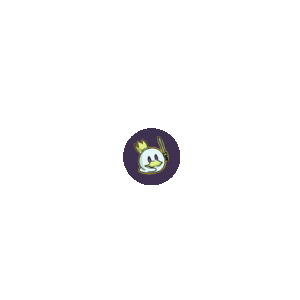


Ad
With the addition of these three cards to the banned and restricted list, we had more cards banned from the format in the last twelve months than in the last fourteen years of the game's existence. That represents a total of 56% of the cards banned in that period.
Let's get straight to the point and make clear something very important that we have to understand and that we have no other option but to accept it as a new reality:
Magic has changed and is no longer the same as we knew
Like it or not, Magic has changed. Nowadays, it has different aspects and objectives than compared to the ones it had ten or fifteen years ago.
After all, the game has grown a lot in recent years, and it is natural for Wizards to make bolder decisions regarding the game in order to invite more and more players while trying to keep its most loyal fans entertained.
To understand these changes, we need to divide our analysis into a few topics that represent both the growth of the game and the consequences that result from it.
1 - Magic Arena is extremely relevant
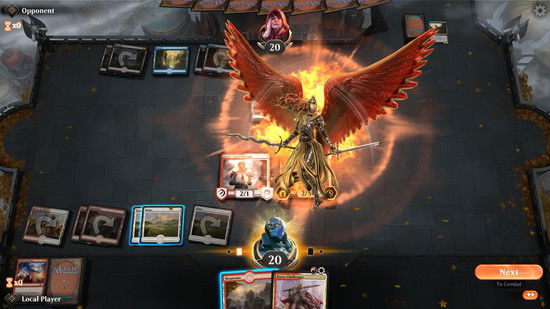
Magic Arena was launched in September 2018, as a platform to introduce Magic: The Gathering to the world of E-Sports with a more attractive look and easier to understand user interface than Magic Online. Since then, it has become a historic mark for the game.
Arena's impact is relevant because the game's popularity grew with the launch of the digital platform. Many new people were introduced, attracted or even felt obliged to try the new "competitor" in the E-Sports business and ended up enjoying it.
It is common to see someone going into a Magic shop and buying cards or introductory decks because they knew the game through Arena.
Another impacting factor of the digital platform which has certainly contributed to the growth of the game are the players who previously did not have the time or even the financial resources to play Magic in a local game store, but who are now able to sit and play in the comfort of their homes for a few hours a week, just to have fun or even to grind ingame events and rewards.
There has also been a greater media repercussion on Magic now that it tries to surf the "E-Sports wave".
Several sites dedicated to discussing Magic Arena have been created, there is always a streamer playing Arena and there are always people watching the transmissions because the platform is visually interesting and fun to watch even for less competitive players. Even ESPN and Globo Esportes (a major Brazilian TV channel) have already published articles about the game since Arena's launch.
Since there are always people playing on the platform now, the number of people playing Standard has grown significantly, and as the data collection from Arena by Wizards is a fully automated process, it is much faster for them to identify common matchups and winrates percentages for each deck and realize whether there is a problem or not.
The concept of "collective mind" created by the constant growth of social networks and the amount of games happening every day at all times allows it to be possible for the community to identify and report problems in the format much faster than it was before the existence of Magic Arena.
Ad
One proof of this fact is precisely that many players already knew that the banning of Fires of Invention would only lead the Reclamation decks to become the best decks in Standard.
And with more and more relevant tournaments in a high level happening through this new online platform, all with an inviting look for the spectator, it is now extremely negative when a deck dominates the format because it is exhausting, tiring and even boring to watch several matches in a row between players piloting the most prevalent deck (especially in mirror matches). Something that happened a few days before the ban was both Reclamation decks and Omnath decks dominating more than half of the metagame in the last two big events hosted by Wizards.
Magic Arena today is one of the most important pillars of the structure of Magic and, in a way, it now shapes the behavior of Standard and the game itself.
There is a meme that says: "Modern problems require modern solutions."
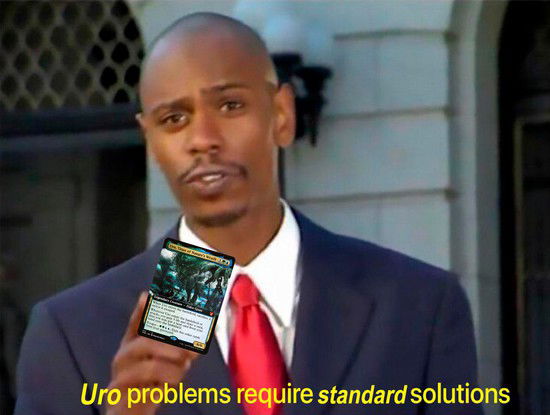
Present-day problems have an identification mechanism in the collective mind of the players and in the newer efficient and automated process of data collection, which allows Wizards to find predominant decks of the format faster than ever before in the history of the game.
And the present-day solution means doing a quicker analysis of these problems in order to create faster fixes, often through bans, instead of long-term solutions like waiting for the next edition to release a new efficient answer to the format problematic cards.
After all, if a deck completely dominates a format, people are forced to build the deck or to simply lose against it. If many people are not able to win regularly because of the best deck, they are most likely not having fun and will soon feel less motivated to play. If fewer people are playing, spending coins, gems, wildcards, time and money, Arena becomes less profitable. And if the problem persists, many players may give up and stop playing the game because of oppressive strategies and decks.
And nothing is worse for a digital platform than players start losing interest in the game.
But, in addition to being necessary to balance the format with immediate solutions, it is also needed to make the game more exciting and interesting for the players, and this is where our second point comes into this discussion:
2 - The way cards are created has changed
There is a term that I usually use with friends that is "Coffee Cards".
The term was born from a moment where I had to explain the effects of Umezawa's Jitte to a player by revealing it with a Stoneforge Mystic, where I finished explaining it with the phrase "And it also makes a coffee too". He was so excited about the card that he wanted to have one on his deck. [TN: This is an expression in Brazilian Portuguese for a card or something that does a lot of things. "It does this, this, this and maybe it even will make you coffee too!"]
"Coffee cards" are cards that may generate a lot of effects. They excite players and are responsible for selling many boosters because people feel they need or will need them to compete or to build that one cool deck they want to play with.
Ad
And these cards fit perfectly into the F.I.R.E. philosophy adopted by the company because they are fun (at least for their controller), exciting and with a good degree of playability in a variation of decks or formats.
A classic Magic argument has always been the famous "Dies to Removal" where, theoretically, we could measure the value of a creature based on the immediate impact it has or the long-term impact the card may have if it is not immediately answered by the opponent, generating a snowball of valuable effects.
A great example of an immediate effect cards has always been the Planeswalkers because, even if they died at the end of the turn or on the next turn, they have probably already generated some value for their controller.
In today's Magic, it seems that the logic of the Planeswalkers has been brought to other types of permanents. Most of the current staples have an immediate impact and/or may cause a huge snowball effect in a few turns.
Compare these two cards, for example:


Nightpack Ambusher is not even the most absurd card that I can name, but it is a tribal lord which, in addition to increasing the power of the creatures of a specific type, it also has Flash and even produces tokens of the creature that it buffs in 4/4 bodies.
Ambusher is the engine AND the payoff at the same time and needs little sacrifices during the deckbuilding to be good, whereas Vampire Nocturnus was a conditional payoff which led him to play only if you had creatures of the Vampire type in your deck so that the card became relevant.
Another common comparison within the community is this:


I remember the repercussions that Siege Rhino had during Tarkir for having an extremely efficient body at a low mana cost while practically having a Lightning Helix as its effect.
Omnath, in turn, is a Siege Rhino which exchanges 1 toughness and trample for a card draw, being able to essentially be played for free (because of its mana generation ability) and still be a board wipe for the opponent's Planeswalkers. Omnath is the perfect example of a Coffee Card.
But let us see an example that is, literally, in the same edition:


Another example of Power Creep is that Baneslayer Angel came out in M21 and simply wasn't played in Standard's metagame, where in M10 the card was the best creature in the edition and the best mid or late-game threat that Standard offered during that time, and which had its only weakness in the possibility of being destroyed before it could attack.
Elder Gargaroth, in turn, was taken as a joke for not passing the "Teferi Test". The irony is that, after the Planeswalker's ban, Gargaroth's reign was short-lived, but it was enough to show that Baneslayer Angel doesn't even compare to a card that generates a much wider range of value every turn.
Ad
This new style of card creation is not just limited to creatures or Planeswalkers, as even enchantments like Confounding Conundrum have a "draw a card" text for immediate value generation.
It is possible to compare the power level of today's Standard with what happened with Titan Cycle, in M11/M12, because many of the creatures generate such a significant amount of value that they demand good responses and/or good prevention effects in order not to become a "power snowball". And it is worth remembering that the Titans were very relevant cards in their existence in Standard along with other predominant forces in the format, as they existed alongside cards that were banned as Jace, The Mind Sculptor and Stoneforge Mystic or from equally strong and efficient cards like Snapcaster Mage and Liliana of the Veil.
Although they existed alongside such powerful cards, the Titans were present on the lists of Standard's main decks, such as UB Control or Wolf Run Ramp, but were kept in check because they were on par with other threats of the format and the efficiency of the available responses of that time.
At the time of the Titans, Standard had access to cards like Mana Leak, Lightning Bolt, Journey to Nowhere and Preordain. Today, we barely have Lightning Strike and our best counterspell is Neutralize, which is nothing more than a Cancel with Cycling.
The responses that are created or reprinted today are much worse than the threats, and that remarkable difference between the pendulum of threats and the pendulum of answers has been Standard's biggest chronic problem in recent years and has probably also been the cause that has led Wizards to ban cards on a recurring basis
And maybe it's intentional. After all, the 2020 Standard was made up of those who managed to shut down their engine first. Like when players cast Scorch Spitter on turn 1, Runaway Steam-Kin on turn 2, Anax, Hardened by the Forge on turn 3 and Embercleave on turn 4.
Or when players ramp during the first turns with Growth Spiral and Uro, Titan of Nature's Wrath and then cast Nissa, Who Shakes the World on turn 4 and stronger bombs on turn 5.
Or by casting Teferi, Time Raveler on turn 3, Fires of Invention on the 4th and Cavaliers or Lukka on turn 5.
Or with Lotus Cobra on 2, then Omnath, Locus of Creation on 3 and then explode on the opponent's face on turn 4.
Current Magic games have been built on building your engine before your opponent's. This is not new, since sequential moves between turns have always existed in the game, or at least have existed since I started playing in 2008.
The difference is that there is an acknowledgment on the part of the company and the players that you will try to build your engine, but can be easily broken by a low cost counterspell, a specific hate effect or that you will simply die before being able to play that card you wanted. That brings negative and frustrating feeling to the player and, to avoid this feeling, cards like Mana Leak are considered "too strong" and are now avoided, while threats and engines are getting stronger.
Ad
Maybe the best logic to explain this philosophy is that it is far more reasonable to ban an engine or a threat than an answer.
But good answers are exactly what could prevent bans.
3 - The Power Creep increase and its effects in eternal formats
Magic is a game with different formats. And what is the best way to impact the eternal and non-rotational formats, if not creating cards that are strong enough to mess with their structure and even create a "rotation"?
Modern 2018, for example, is only a shadow of Modern 2020. Cards like Uro, Titan of Nature's Wrath, Veil of Summer, Force of Negation, Lurrus of the Dream-Den, Dryad of the Ilysian Grove, Skyclave Apparition and Teferi, Time Raveler, among others, are cards that were released in the last two years and that impacted the format significantly.
Even well-known archetypes like TitanShift, Humans and Death's Shadow needed to readjust their lists and today they adopt at least four cards from the most recent collections in their maindeck.
Legacy has also been impacted by recent releases, being Uro, Titan of Nature's Wrath, Dreadhorde Arcanist, Ice-Fang Coatl, Arcum's Astrolabe, Force of Negation and Oko, Thief of Crowns among the most played, while brand new archetypes like Hogaak, 4 Color Snow and Ninjas have emerged in the past two years.
And Vintage... well...
Lurrus of the Dream-Den is banned on Vintage and I believe that speaks for itself. Oh yes, and here's the image of a 3/3 Black Lotus Elk closing a game at last year's Eternal Weekend.
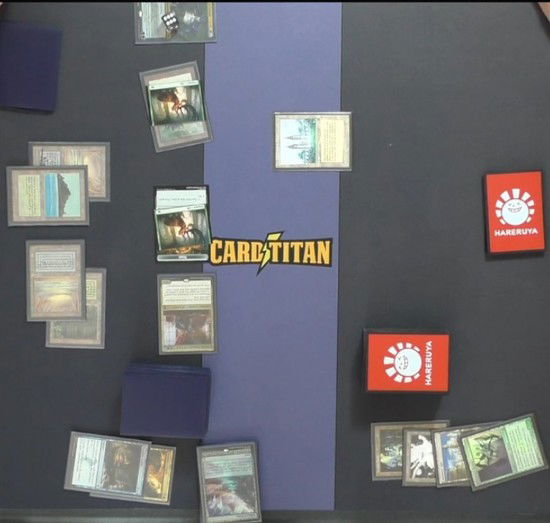
Of course, this is also a big divider of public opinion: While there are players who approve of the new cards having a greater impact on eternal formats, there are players who feel that their deck has been weakened or even invalidated by the latest additions.
But that kind of "rotation" is part of the nature of the game. Legacy, before the release of Delver of Secrets, was quite different. Modern, before the release of Fatal Push or the low-cost Eldrazi, was also quite different.
New cards are released all the time, and it is possible to consider a great success on the part of the design team when a card is able to impact in a non-overwhelming way the eternal formats.
Another notable point in this increase in Power Creep is how the cards launched in recent years and which were banned in some formats, interacted with or altered the game zones that make up the essence of Magic: Mana, Sideboard, Interactions, Costs and even Variance.
For example:
Fires of Invention and Wilderness Reclamation are good examples of cards that allow you to have "free mana" and enable the player to make multiple choices and moves in a single turn while breaking the basic rule that lands and mana are power limiters.
Lukka, Coppercoat Outcast and the not yet banned on Standard Winota, Joiner of Forces are good examples of cards that allow you to circumvent mana costs and play certain cards without having to pay their mana cost.
Ad
Teferi, Time Raveler greatly reduced the game's interaction possibilities by limiting the moments when the opponent could play his/her spells, reducing the efficiency of instant-speed effects while keeping other strategies in check during his existence in Standard.
Companions are a good example of guaranteed access to a specific card without any interaction, since it is part of the Sideboard. It is so absurd and dangerous that they had to change their rules, since the concessions in deckbuilding became irrelevant, mainly in eternal formats.
Finally, Once Upon a Time and, while not necessarily problematic, cards like the Castles of Eldraine or the SpellLands of Zendikar are a way to try to mitigate land flood or lack of mana to ensure more games are fun and interactive between players, reducing the number of games where a player loses because he/she just couldn't play Magic.
In fact, it was in order to reduce the variance factor dictating games before they even started what led to a change in Mulligan's rules.
It is clear that the Design team is choosing and experimenting with bolder mechanics in order to create an increasingly innovative game with cards capable of impacting all formats, at the same time that they are taking the risks (consciously or not) of creating cards that may be too strong and which may completely unbalance the pendulum of these formats.
Because of this, there is another step that has been taken by the company in recent years.
4 - Banning cards ceased to be a taboo and became a regulatory instrument
Where before there was a very serious conversation and stance on the part of Design chiefs that the best option was always to avoid banning cards in order to prevent fear among players, the team seems to have redefined that value in 2017.
In fact, Sam Stoddard himself commented in one of his articles that the number of bans in Standard was too high and this resulted in cards like Collected Company not being banned during their existence in the format.
Today, above the security of not having to ban cards, the fun factor that has always been mentioned by the design team as relevant when banning a card seems to be greater than ever and, with even greater feedback that is more recurring and more easily received with the rise of social networks and the expansion that Magic Arena has provided, banning cards has become a solution to solve the problems that has become more and more immediate.
So much so that the company abandoned its practice of announcing changes every three months and now makes its update announcements literally when it believes it is necessary.
Using the banlist as a regulatory tool may be something new for Magic, but it is far from being something new for the TCG world.
The closest example in my knowledge is that of Yu-Gi-Oh!, where cards are banned, unbanned, restricted, etc. every 3 months at a point where there is always speculation of what may be banned or unbanned, and the belief that no strong deck can stay in its "full power" status forever is prevalent.
Ad
A recent example of absurd cards being released in other TCGs that will be banned at some point is the Red-Eyes Dark Dragoon card
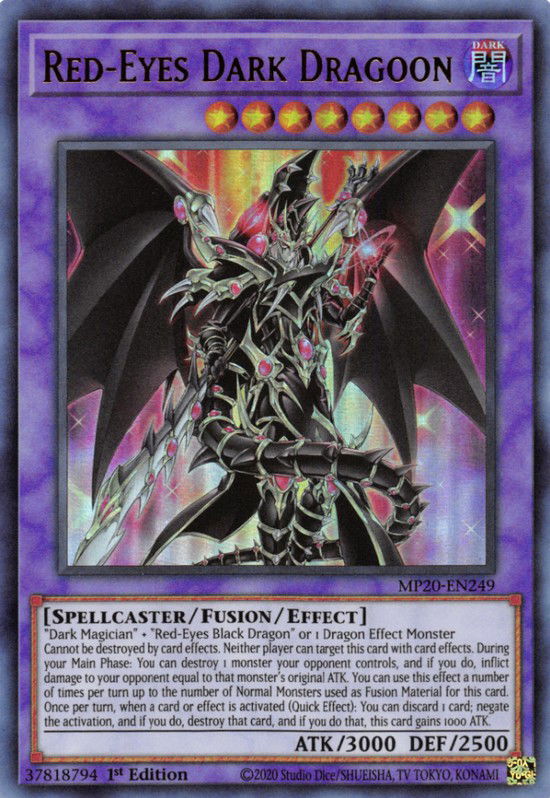
Dark Dragoon is not banned in Yu-Gi-Oh! yet.
In fact, it has just been released in the west, but it is already banned in OCG (a format that only exists in the eastern regions, where cards are released in advance), so there is awareness that the card is so absurd that eventually it or any part of your engine will be banned.
With a banlist update planned only for December, the card will have a few more months of presence before any possibility of direct intervention against it.
That is, if there is a direct intervention in December, as Konami is known for occasionally making decisions on what to ban or unban based on commercial factors.
And we can say that the same can happen or even already happened in the world of Magic. Bans (or the absence of them) may exist due to commercial actions.
Everyone knew that Omnath, Locus of Creation needed to be banned and that banning Uro, Titan of Nature's Wrath was just a poor fix for a card from an already "old" edition due to the real problem that was in the new edition. Before that, everyone knew that banning Bridge from Below would do little to slow the monster that was the deck of Hogaak, Arisen Necropolis.
And of course, people speculated heavily that Wizards chose not to ban Omnath because it was too early, commercially speaking, to ban a card that stores were still receiving and/or pre-ordering.
There is also a cruel reality to be accepted that using the banlist as a regulatory tool makes the common player much less secure to invest cash in a deck to compete. As an example, I will use the main platform of the game today: Magic Arena.
Regardless of how you acquire Wildcards, let's assume that you have decided to build the best deck of Standard. You will probably spend a significant amount of rare and mythical Wildcards on cards like Lotus Cobra, dual lands, triomes, ultimatums, etc.
And while these cards don't disappear from your collection and you receive a refund on Wildcards for the cards you had that were banned, you spent a lot more of them to build the deck with other cards that may now be of little use or even absolutely useless for your next decks.
You now have a stack of rare cards that serve as a base for other decks, but which you will need to spend more Wildcards to build these and that you have no other way to acquire if not buying more packs or playing drafts.
In the end, you lost a deck. You have a considerable portion of dead cards in your collection, and Wizards will receive even more resources from you so you can build a new deck.
Unlike Paper Magic or even Magic Online, the absence of a trading system (or even a Dust system, like Hearthstone) in the game makes it difficult for you to somehow mitigate the damage from the investment made on the deck that you chose to build and that was banned in order to invest in a new deck.
Ad
While this does not seem to be a problem for professional players who mostly have the support and sponsorship from major stores and teams, it is a huge problem for players in local stores or the person who plays Magic Arena at the end of their workday or for those who are trying to climb the ladder to Mythic in the Season.
And in reality, even a renowned player and commentator for StarCityGames tournaments such as Todd Anderson recently criticized the Magic Arena economy system.
It is absolute and imperative that banning cards on a more recurring basis significantly reduces the Magic player's security and confidence in investing their money to set up a specific deck due to the financial uncertainty regarding a possible card ban.
This does not necessarily mean that we should be afraid to build a certain deck because of a possible ban, but it may be necessary for players to consider whether the investment in that deck is really worthwhile if it is being too efficient by the standards of other format decks and if you would be getting the expected return before it was possibly banned.
Several TCGs also suffer from these effects with recurring bans or even errata texts on cards to correct formats and maintain the health of the game.
With Magic, it will be no different.
Players adapt, and the game survives.
And it is also worth remembering that, at the end of the day, Magic is a product.
5 - Magic: The Gathering is a product to be sold

Like it or not, despite being a game and a hobby for many, Magic is a business. A product. Magic belongs to Wizards of the Coast which, in turn, belongs to Hasbro.
And all that Hasbro wants and expects from you is your money. And Magic is a means for Hasbro to have your money. And Hasbro has demonstrated how to use Magic to get your money.
Among Collector Boosters that now come out in all editions, the Double Masters VIP Boosters that cost $100 each and the increasingly frequency of Secret Lairs being launched, Wizards has been creating more and more "exclusive" products which are too expensive for the common player and which are aimed at the public with greater purchasing power.
It is an explicit way of demonstrating that the company is willing to produce more specific products, if some people are willing to pay for them.
Going back to the main product of Magic today, it is worth noting again that the entire economy of the Arena is extremely predatory and not favorable for anyone who wants to spend their money to obtain Wildcards, which are the only way to obtain the cards you want in the game.
The Magic Arena Economy is very simple: You buy gems with your money (with the best offer being 20,000 gems for $100). With these gems, you open Boosters (With 20,000 gems, you open on average just over 100 Boosters), and with the open boosters you accumulate Wildcards (every 6 Boosters, a rare Wildcard, and every 24, a mythical Wildcard) and you can exchange them for the cards you want or need to complete your decks.
Ad
And with the absence of a trading or Dust system, Wizards is able to focus the entire game economy around Wildcards, making them the only source for the online player to get the cards they need to play with the deck he/she wants to play.
Either that, or you take a long time to finish your deck by doing the daily missions and opening boosters with the coins received, or you play the draft events with great results and grind them.
Ultimately, Wizards will get what they want from you with Magic Arena when you want to build a new deck: Be it your money, or your time.
As a business, Magic: The Gathering has grown a lot in recent years and is more profitable than ever, according to Hasbro itself. And the company expects the game to continue to become increasingly profitable for years to come.
Despite the many changes and controversies in recent years, months and weeks, the game continues to grow. And it is obvious that we wonder why, even in the face of some clearly harmful market decisions, the game continues to grow a lot.
What about our reaction?
6 - We are the voice of the community, but the final decision is theirs
The reality is that we, as customers and players, have little power to intervene in company decisions, as Magic covers many different types of audiences and Wizards knows this.
Even if a product like Secret Lair: The Walking Dead causes a very negative reception, we know that there will be countless investors and collectors who will buy the product for their personal purposes.
Even if the community criticize content creators who had access to the product, this does not directly affect the company and does not prevent Wizards from making this offer to such creators who, technically, are rewarded and/or paid to advertise these products.
After all, if you were a content creator or an investor with enough money to invest in the game, wouldn't you purchase Secret Lair: The Walking Dead as a product that acts as a "second Reserved List" and that will have great commercial value in the long run, both for linking the game to a famous TV series around the world and for its low availability and repercussions generated on social networks?
Proof of this is that this Secret Lair will be produced on demand. That is, Wizards really experimented to see if it was possible to make this type of product and if it would be profitable for the company.
At the end of the day, the gaming market remains active and the products the company creates are still being purchased. This is beyond me, you or even your local community.
The company may admit some mistakes, compensate for others, but at the end of the day, it's all about business decisions and even if we treat the game with all the love and affection in the world because it makes us able to meet with other people and create unique moments of fun and interaction, it is a way to make a gigantic company profit.
Ad
The gear that drives Magic's machine today is very large, and each player, content producer, investor, shopkeeper and collector is just a small piece of that system.
This does not mean that we should not criticize and express our thoughts when the company makes mistakes and just act passively, accepting all decisions from Wizards about the game.
After all, the satisfaction factor is important for any company, especially in the gaming industry. Poor game development decisions may destroy the company in the long run, so it is important that the community have an active voice and make its intentions for the company very clear.
And it is also important for Wizards and Hasbro to have an ear for the voice of the community because, at the end of the day, making a game where players are satisfied and willing to play brings much more profit over the years or even decades, while making questionable decisions for the sake of investment and profit may alienate players and create a negative image of the product for old and new generations.
However, we also know that...
7 - Wizards has made more mistakes than healthy decisions
Among questionable commercial decisions, increasing the number of new products every year, constant need for direct intervention in formats, rise of the digital platform, unfavorable monetary system for the player, excessive complexity in climbing to the professional scene and reducing the award of high-profile events level of reduced transparency regarding data regarding the game in recent years, the feeling I get is that Magic has grown a lot, and neither Wizards nor Hasbro are able to deal with this fact in the best possible way and they end up constantly stumbling on rookie mistakes.
We are in crucial moment for the future of the game, where it may grow exponentially and become infinitely bigger than it is today, or it can fail miserably in its goals and even become a joke in the E-Sports business, that the company tries to venture into today, due to its amateurism.
Amateurism that endangers the health of the formats, the confidence of buyers and the fun of their players to the point where we have almost a ban every month.
That created a digital platform with many flaws that need to be corrected, as a spectator mode, which is inconceivable that the game does not have it yet if it intends to establish itself in the field of E-Sports. That has reduced the number of views on its official streaming channels and presented unique moments in its large official events like an adult pop-up appearing on a player's screen during a match. The event is subject to criticism even from renowned Hall of Fame players.
That created an absolutely confused competition system which nobody knows how to easily explain and not even define what each event means to the large audience. That discourages players from competing in the most professional caste of the game due to lack of recognition and reduced prizes.
Ad
The reality is that any and all effects of Wizards' bad decisions today will take years to be felt by the company itself.
Perhaps, ten years from now, Magic will be in a new era, going into its 40 years of existence having learned from the many mistakes and successes along its journey.
It remains for us to wait for the then-grown Magic: The Gathering to have, on the part of its managers, healthier and more competent decisions within the next few years, where it will still be possible to create increasingly fun and innovative mechanics, but knowing how to balance the risks between bans, products made for a specific audience and broken cards.
I will never say a phrase like "The Magic will end", because the game is unlikely to end after being consecrated in the TCG market in its 27 years of existence.
What will happen is that the game will continue to reinvent itself to attract a broader audience. And reinventing requires big risks, and Hasbro is willing to take those risks even if those risks include driving some of the most loyal players out of the game.
Conclusion: At the end of it all, Magic is about fun
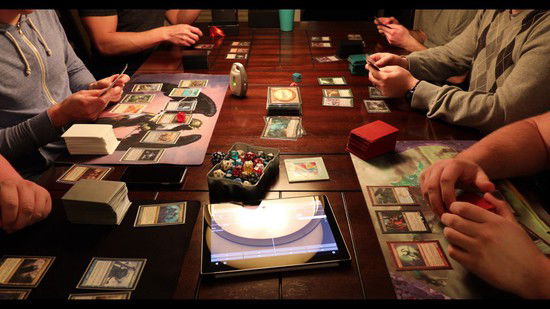
Even if you don't support Wizards' decisions or feel nostalgic about another time in the game's past, if you're having fun playing, Magic is worth it.
Whether playing in a tournament with your Legacy deck or at the kitchen table with your pre-assembled Commander right out of the box, if you're having fun, Magic is worth it.
The game may be undergoing changes and we may be actively debating how the changes are made to it and how we do not approve the company's business decisions, but at the end of the day, if we are still having fun playing alone at the Arena or MTGO or laughing with friends at a store table or at home, Magic is still worth it.
After all, the game is called Magic: The Gathering, and this Gathering is the most important factor in the game. It keeps us passionate about it: The ability to get together with people to debate and talk about a common hobby, or even a feeling of self-satisfaction when winning that tough match or activating that stupid combo that you were dying to make it work. Magic provides us with many emotions, whether they are good or bad, and it becomes a part of our life which brings us closer to other people and even to ourselves.
This defines the true meaning of The Gathering.
At the end of the day, Magic is about how much fun we have.
And we're still having a lot of fun.
I can't wait for this pandemic apocalypse to pass, so I can get together again with my friends and co-workers to have fun (or get pissed off) playing my favorite card game.
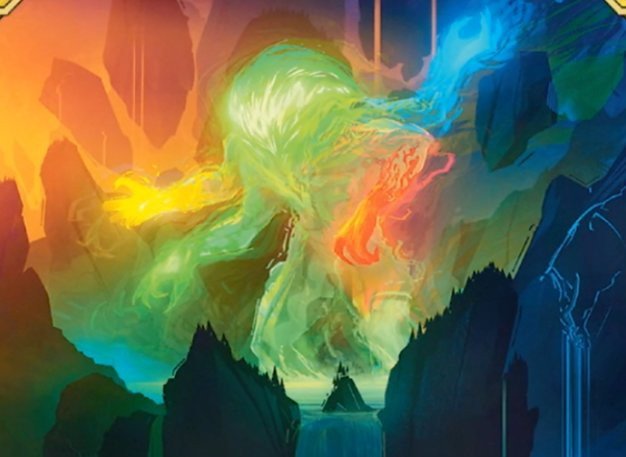



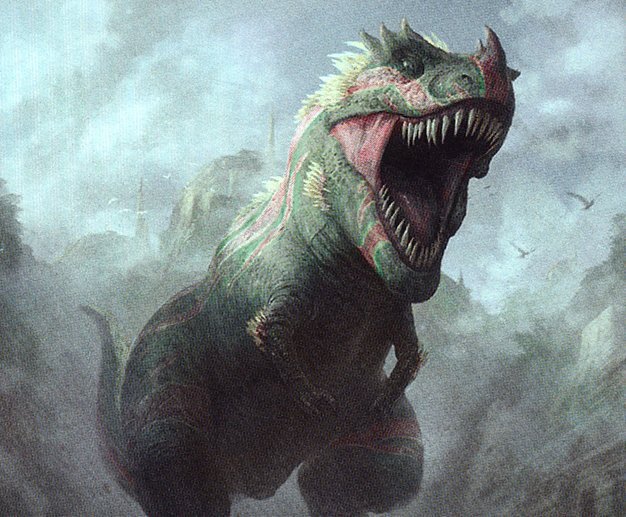
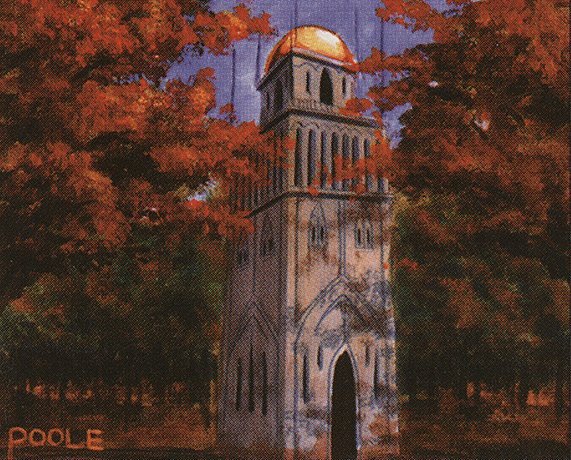



— Comments0
Be the first to comment